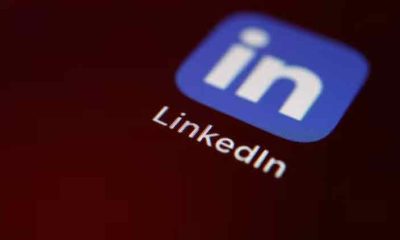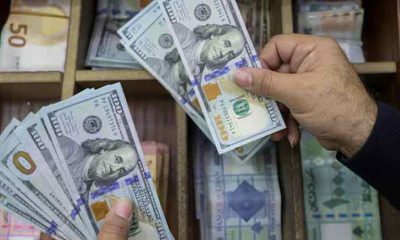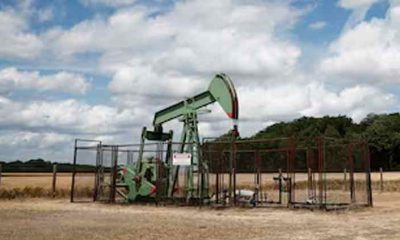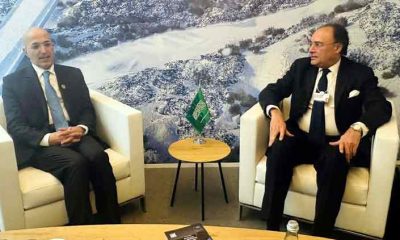World
Trump, DeSantis vie for evangelical vote in D.C. face-off
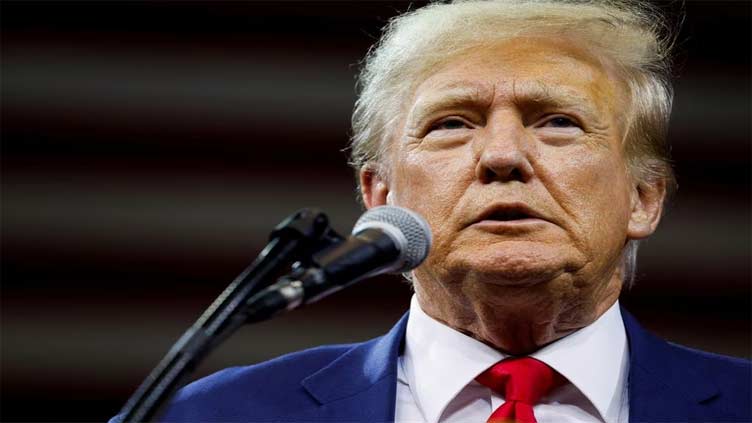
Former U.S. President Donald Trump and Florida Governor Ron DeSantis made their cases to evangelical voters who gathered in Washington for a pair of events on Friday, seeking an edge with a voting bloc likely to play a pivotal role in selecting a 2024 presidential nominee.
The pressure was all on DeSantis, who trails Trump in the Republican presidential primary by nearly 40 percentage points in most opinion polls, including among evangelical voters.
Both candidates spoke at a pair of national summits convened by the Concerned Women of America and the Family Research Council, evangelical advocacy groups that support laws restricting abortion among other issues.
At the Family Research Council event, DeSantis defended allowing churches to remain open in Florida during the COVID-19 pandemic, drawing cheers from the ballroom crowd.
“We protected our religious institutions when so many states were running roughshod over people’s rights to practice their faith in full,” he said.
DeSantis also talked up Florida’s law that bans abortion at six weeks, one of the most restrictive in the nation. “We have stood up,” he said.
Trump also addressed abortion at the council event, saying he supports bans with exceptions for rape, incest and to save the life of the mother, a position that was received coolly by the crowd.
Trump said a more restrictive position on abortion damages Republicans in elections.
They lost a lot of elections, and we can’t let that happen,” he said. “Many politicians who are pro-life do not know how to properly discuss the topic.”
Longtime president of the council, Tony Perkins, a prominent evangelical leader, did not endorse Trump during his 2016 campaign and has yet to endorse a candidate this time around. But introducing Trump, he praised him as “a man who fights for what he believes in.”
Even with Trump’s sobering talk on abortion, there was little sign he has lost his grip on social conservatives. He received a thunderous ovation from the crowd.
Trump holds a roughly 35 percentage-point lead over DeSantis and Vivek Ramaswamy among evangelical Christians, according to a Reuters/Ipsos poll that closed on Thursday.
Those voters have stood by the twice-divorced Trump even as he rarely invokes scripture or speaks with an evangelical bent, and as he has faced a series of charges involving attempts to overturn the 2020 presidential election and a scheme to pay “hush money” to a porn star.
Many Christian activists credit him for helping to bring an end to nationwide abortion rights by appointing three conservative justices to the U.S. Supreme Court, which last year overturned the landmark 1973 Roe v. Wade decision.
Robert Goss, 77, a retired law-enforcement officer from Locust Dale, Virginia, was awaiting Trump and DeSantis at the council event, saying he was still deciding which candidate to support.
Goss said he could be persuaded to vote for Trump again, but “he’s got to get past all the legal things. And I just don’t want four more years of nothing but fighting and bickering. We want to get something done.”
Hannah Brusven, 25, a political organizer from Idaho who attended the women’s event in Washington, said she was initially interested in DeSantis, but she had turned back to Trump.
“I really was thinking DeSantis would be a perfect person because he’s young, he’s vibrant. He could have been a new JFK,” Brusven said, referring to popular Democratic President John F. Kennedy. “But he wasn’t.”
DeSantis’ advisers are betting he can eat into Trump’s significant polling lead by outperforming among devout Christians, especially those who are affluent and well-educated, according to several people familiar with his strategy.
That could be a major factor in the state of Iowa, where white evangelical voters are expected to turn out in large numbers in the first 2024 Republican nominating contest four months away.
On Thursday, DeSantis unveiled a “Faith and Family Coalition” of more than 70 faith leaders backing him in Iowa, New Hampshire and South Carolina, all early voting states.
DeSantis and several other Republican primary contenders are due to speak at the Iowa Faith and Freedom Coalition’s fall banquet on Saturday in Des Moines, another major gathering of religious conservatives.
Trump, who has a rocky relationship with some key political figures in Iowa, will not attend.
World
Shooting, explosions in Jenin as Israel presses raid

Gunfire and explosions rocked the Jenin area of the occupied West Bank on Wednesday, an AFP journalist reported, as the Israeli military kept up a large-scale raid for a second day.
The operation, launched just days after a ceasefire paused more than a year of fighting in Gaza, has left at least 10 Palestinians dead, according to Palestinian health authorities.
Israeli officials have said the raid is part of a broader campaign against militants in the West Bank, citing thousands of attack attempts since the Gaza war erupted in October 2023.
“The situation is very difficult,” Jenin governor Kamal Abu al-Rub told AFP.
“The occupation army has bulldozed all the roads leading to Jenin camp and to the Jenin government hospital… There is shooting and explosions,” he added, referring to the Israeli military.
Israeli forces have detained around 20 people from villages around Jenin since the operation began on Tuesday, the official said.
An AFP correspondent reported hearing gunfire and explosions from the northern city’s refugee camp, a hotbed of militancy where Israeli forces have carried out repeated raids.
In December, Jenin area militants also clashed with the security forces of the Ramallah-based Palestinian Authority.
‘IRON WALL’
The Israeli military said it was continuing with the operation, dubbed “Iron Wall”, adding that it had “neutralised over 10 terrorists”.
“Additionally, aerial strikes on terror infrastructure sites were conducted and numerous explosives planted on the routes by the terrorists were dismantled,” it said in a statement.
The raid in Jenin aims to counter “hundreds of terrorist attacks, both in Judea and Samaria (the occupied West Bank) and the rest of Israel,” military spokesman Nadav Shoshani said at a press briefing.
He said that since the start of the Gaza war, Israel had seen “over 2,000 terror attack attempts” from the West Bank, adding that the army had “eliminated around 800 terrorists”.
Shoshani said the explosive devices planted along roads had recently killed a soldier in the area.
Islamic Jihad, one of the factions present in Jenin, condemned what it called “the systematic displacement, destruction and killing carried out by the occupation army against Jenin refugee camp”.
The Palestinian Authority’s foreign ministry accused Israel of “collective punishment” and said the raid was part of an Israeli plan aimed at “gradually annexing the occupied West Bank”.
‘DECISIVE OPERATION’
Defence Minister Israel Katz vowed to continue the raid in Jenin.
“It is a decisive operation aimed at eliminating terrorists in the camp,” Katz said in a statement on Wednesday, adding that the military would not allow a “terror front” to be established there.
“It is a key lesson learnt from Gaza… we do not want terrorism to recur in the camp once the operation ends,” he said.
Prime Minister Benjamin Netanyahu said the raid aimed to “eradicate terrorism” in Jenin.
He linked the operation to a broader strategy of countering Iran “wherever it sends its arms — in Gaza, Lebanon, Syria, Yemen” and the West Bank.
The Israeli government has accused Iran, which supports armed groups across the Middle East, including Hamas in Gaza, of attempting to funnel weapons and funds to militants in the West Bank.
United Nations Secretary-General Antonio Guterres called for “maximum restraint” from Israeli security forces and expressed deep concern, deputy spokesman Farhan Haq said.
Violence has surged throughout the occupied West Bank since the Gaza war erupted on October 7, 2023.
According to the Palestinian health ministry, Israeli troops or settlers have killed at least 848 Palestinians in the West Bank since the conflict began.
During the same period, at least 29 Israelis, including soldiers, have been killed in Palestinian attacks or Israeli military operations in the territory, according to Israeli official figures.
World
Saudi Arabia plans 600bn dollars in new US investment, trade over four years

Saudi Arabia Crown Prince and Prime Minister Mohammed bin Salman told President Donald Trump that the kingdom wants to put $600 billion into expanded investment and trade with the United States over the next four years, the Saudi State news agency said early on Thursday.
The crown prince expressed it during a phone call with Trump, who took oath for his second term on January 20.
During the call, the crown prince conveyed the congratulations of King Salman bin Abdulaziz Al Saud and his own congratulations to the President on the occasion of his inauguration, and wished the friendly American people more progress and prosperity under the President’s leadership.
The two leaders discussed ways for cooperation between the Kingdom and the US to promote peace, security and stability in the Middle East, in addition to enhancing bilateral cooperation to combat terrorism.
The leaders also discussed ways to enhance bilateral ties in various areas, and the crown prince noted the US administration’s ability to create unprecedented economic prosperity and opportunity through anticipated reforms in the United States, and that the Kingdom seeks to participate in these opportunities for partnership and investment.
The US president expressed his appreciation and thanked the Saudi leadership for their congratulations, and affirmed his keenness to work with the Kingdom on all that benefits the interests of both countries.
Trump said following his inauguration on Monday that he would consider making Saudi Arabia his first destination for a foreign visit if Riyadh agreed to buy $500 billion worth of American products, similar to what he did in his first term.
“I did it with Saudi Arabia last time because they agreed to buy $450 billion worth of our product. I said I’ll do it but you have to buy American product, and they agreed to do that,” Trump said, referring to his 2017 visit to the Gulf kingdom.
World
US decision to cancel Afghan refugee resettlement exposes Western hypocrisy

An executive order by US President Donald Trump to suspend resettlement of all refugees, including Afghans, for an indefinite period is being seen as a betrayal of those who supported the International Security Assistance Force (ISAF) and NATO in Afghanistan.
Nearly 1,660 Afghans cleared by the US government to resettle in the US, including family members of active-duty US military personnel, are in limbo since the Trump-led administration took extreme decision.
The order has left them stranded while it is expecting from Pakistan, which has hosted millions of Afghans for decades on humanitarian grounds, to share the burden again.
Instead of easing the burden, the US ban has only intensified challenges for Pakistan and other neighbouring host countries.
Furthermore, the western countries, which have been criticising Pakistan for repatriation of illegal immigrants, are refusing to accept refugees by giving lame excuses, abandoning Afghan refugees when they need help the most.
The Human Rights Watch (HRW), the Amnesty International and the EU keep an eye on Pakistan’s policies while there is no focus on the hypocrisy being showed by the Western countries by banning refugees after using them as pawns.
The international community must hold the US and EU accountable for their bans and pressure them to contribute fairly to managing the Afghan refugee crisis.
Trump made an immigration crackdown a major promise of his victorious 2024 election campaign, leaving the fate of US refugee programmes up in the air.
The State Department on Wednesday implemented the order, announcing that all refugee arrivals were indefinitely suspended, all previously scheduled travel cancelled and new refugee applications, as well those in process, were suspended.
-
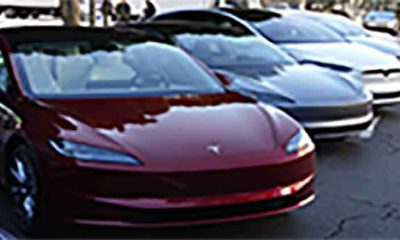
 Business2 months ago
Business2 months agoAuto industry’s shift toward EVs is expected to go on despite Trump threat to kill tax credits
-
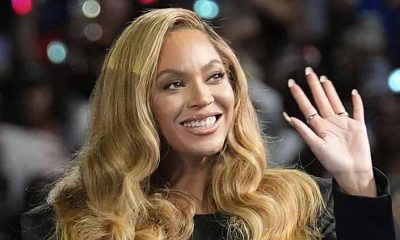
 Entertainment3 months ago
Entertainment3 months agoBeyoncé leads the 2025 Grammy noms, becoming the most nominated artist in the show’s history
-
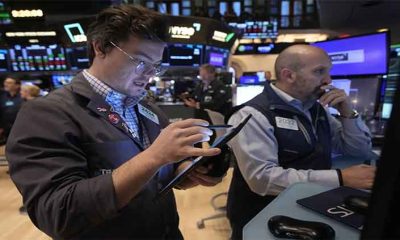
 Business3 months ago
Business3 months agoWall Street cruises toward the close of its best week in a year
-
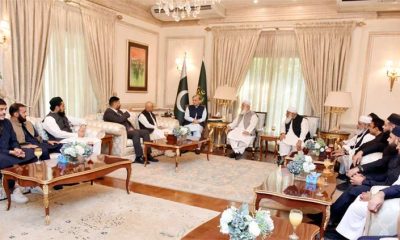
 pakistan3 months ago
pakistan3 months agoPM Shehbaz terms promotion of foreign investment as top priority
-

 World2 months ago
World2 months agoSix Israeli troops killed, deadly strikes in Lebanon
-
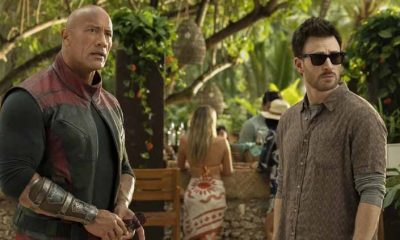
 Entertainment2 months ago
Entertainment2 months agoMovie Review: ‘Red One’ tries to supersize the Christmas movie
-

 Business2 months ago
Business2 months agoWall Street gains ground as it notches a winning week and another Dow record
-
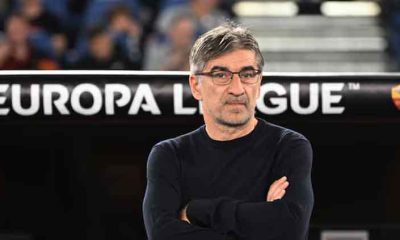
 Sports1 month ago
Sports1 month agoSouthampton set to sign Juric as new manager





